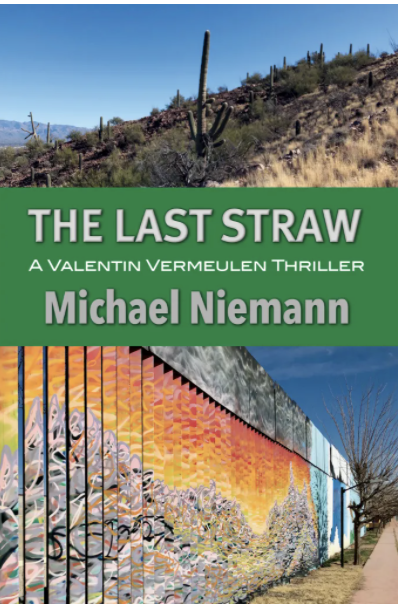 The Last Straw by Michael Niemann is the sixth book in the series about the Belgian fraud investigator for the U.N. who wrestles with some of the most difficult political issues of our time. This book starts with an American in the wrong place at the wrong time, a young refugee, and a skeleton in the desert.
The Last Straw by Michael Niemann is the sixth book in the series about the Belgian fraud investigator for the U.N. who wrestles with some of the most difficult political issues of our time. This book starts with an American in the wrong place at the wrong time, a young refugee, and a skeleton in the desert.
Expecting a little down time, Vermeulen joins his partner Tessa Bishonga on a research trip to the US/Mexican border in Arizona. Instead he is drawn into the investigation into skeleton of a mudered man found in the Sonoran desert. The dead man’s notebook contains Vermeulen’s phone number. The local authorities are looking for evidence of trafficking networks and interrogate Vermeulen. Vermeulen is compelled to dig into the case himself.
As Bishonga and Vermeulen delve into the inhuman and dangerous world of refugees and migrants they are targeted by cartels that want to put a stop to their interloping. And a right-wing milita group wants to teach Bishonga a lesson for writing about them. But the danger doesn't end there: a killer, who evaded justice at Vermeulen's hand seven years earlier, sees an opportunity for revenge.
Until now, Vermeulen has brought his skill and taste for action to issues in Africa and the Middle East, and, in the wonderful Percentages of Guilt, in Europe. This book is set against the tragic border policies of the United States, Vermeulen and Bishonga face their biggest challenges yet, and the threats aren’t only coming from the criminals.
The Last Straw is a fabulous culmination to the Vermeulen series to date, and Niemann's writing is at its best.
I love Vermeulen and I've reviewed nearly every book in the series. Here is my review of Legitimate Business and Illicit Trade, the first two books in the series. My review of the third book, Illegal Holdings, is here, and the fourth, No Right Way. In my previous reviews of books in this series I focused on the figure of Vermeulen himself. I asked Niemann why Vermeulen was Belgian, and he said "I wanted to write a character who could go all over the world. He had to be multi-lingual. And he had to come from a country with no axe to grind. He couldn't be German or American because these countries still want to throw their weight around. So I picked the smallest country I could, which was Belgium." In my review of his third book focused on Niemann's gift for depicting setting and for creating fascinating supporting characters.
Niemann's entire Vermeulen opus has "refugees" as a thematic throughline. When a citizen is compelled to leave the place where he or she was born and formed, where do they go? How do they get there? In earlier books focused on the people who help them, with a special emphasis on the strong women who run the NGOs and fight the front-line battles to keep the refugees alive. There was also a focus on who polices refugees, whether UN peacekeepers or local military police.
In The Last Straw, the perspective has shifted. It is a refugee, a little boy, who helps Vermeulen solve a case. Vermeulen, who did a lot of soul-searching and wrestling with the sins of his past in Percentages of Guilt, continues to change and grow in this latest installment. The book was a finalist for the Spotted Owl Award.
Order Now
Bookshop.org
Indiebound
Amazon
Barnes & Noble

About the Author
Award winning author Michael Niemann has long been interested in the sites where ordinary people’s lives and global processes intersect. He’s shared umqombothi with shack dwellers outside Cape Town, interviewed Morgan Tsvangirai, former Prime Minister of Zimbabwe, when he was still a trade union leader, and has seen Eduardo Mondlane’s dorm room at Northwestern University, faithfully recreated at the Museum of the Revolution in Maputo.
His short stories have appeared in Vengeance, the 2012 Mystery Writers of America anthology edited by Lee Child, and Mysterical-E. Africa Always Needs Guns, Big Dreams Cost Too Much and Some Kind of Justice are now available as Kindle singles.
On the non-fiction side, he is the author of A Spatial Approach to Regionalism in the Global Economy (2000). His academic articles have appeared in numerous journals and several edited books.
